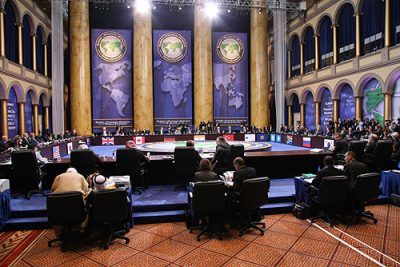That is not unusual, as many international organizations rely on voluntary compliance. This imposes constraints on the ability of the G20 to create rules which can be applied to non-members—or for that matter, to dissenting members.
What then can the G20 legitimately do?
Firstly it provides an opportunity for leaders to share experiences as well as an opportunity to engage in bilateral meetings to pursue their own agendas. We should not underestimate the significance of confidence-building through personal relationships, nor should we expect too much from merely adding another occasion on which it can be practised.
The G20 provides leaders with an opportunity to submerge their domestic agendas in a wider common endeavour. One of the major contributions of APEC was that it encouraged unilateral reform. Participants were assured that criticism could be counteracted by evidence that on a wider international basis: similar actions had been
taken elsewhere.
This does not lead to positive evaluations when commentators try to distinguish between the effects of APEC separately from the effects of multilateral or unilateral action, but it is nevertheless a positive contribution. It is essentially the ‘Alcoholics Anonymous’ impact in which participants know perfectly well what they should do and that they themselves are best placed to do it, but benefit from the mutual support available through occasionally gathering with others facing the same problems. The G20 widens the group sharing this experience, and we can expect benefits for both those who were members of G7/G8 and those who were not.
The G20 provides an opportunity for participants to resolve disagreements. The record so far is limited—G20 statements repeat the familiar more than they demonstrate progressive resolution of issues. For example, there was no statement on improving the performance of rating agencies beyond the obvious that it would be desirable to do so. The G20 could barely close the gap between European reliance on more regulation and US wishes to allow tailored over-the-counter derivatives. These derivatives are to be traded among sophisticated investors while requiring standardised contracts and exchanges (which permit tracking of risk incidence) for other investors.
The G20 has done nothing to generate understanding of the extent to which the global financial crisis could be attributed to a ‘savings glut’ rather than policy errors in developed economies. Still, these are early days.
The principal impact from meetings of leaders is often that they set a timetable by when real work has to be completed. The APEC Economic Leaders’ meeting has long had this principal purpose, although it has escaped most media commentary. The East Asia Summit (EAS) has set timetables for both the work of the Economic Research Institute for ASEAN and East Asia (ERIA) and for working groups towards an East Asian free Trade Agreement and the closer Economic Partnership of East Asia. How this will work with greater US and Russian engagement in the EAS has yet to be seen. There is little equivalent to the G20 beyond ad hoc groupings, and one of the big issues for the G20 is how it will interact with regional organisations, international financial institutions, and regional development banks to develop such an agenda.
In these respects, the ‘legitimacy’ of the G20 rests essentially on consensus. The G20 is influential because of the size and significance of its members. Non-members will demand that they be allowed a voice on important deliberations and will challenge the ‘legitimacy’ of any claimed agreements on which they have not in some way been consulted.
A different kind of ‘legitimacy’ is involved if the G20 should claim an ability to impose requirements on simply anybody. Non-members will especially question any type of coercion. There is no link to the treaty basis which is the eventual basis for United Nations processes. Enforcement mechanisms may be indirect. Compliance with international banking norms and processes, for example, may rest mostly on access to certain banking resources. Also, compliance with international accounting standards may rest most on desire for access to US capital markets. Surveillance through customary international law is slow to evolve and slow to respond to particular issues.
We may well be sceptical for quite a while of the likelihood that the G20 will agree on anything which looks at all coercive. We can be content with seeing a wider body of world leaders contributing to the evolution of international processes and norms. The ‘legitimacy’ of the G20 in any attempt to go further will rest essentially on its ability to motivate and accept input and support through regional organisations in implementing any agreed processes.
Gary Hawke is Fellow at the New Zealand Institute of International Economic Research, Professor Emeritus and was formerly Head of the School of Government at the Victoria University of Wellington, New Zealand.
This is an article from the most recent edition of the East Asia Forum Quarterly: ‘Asia and the G20’.

